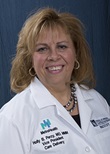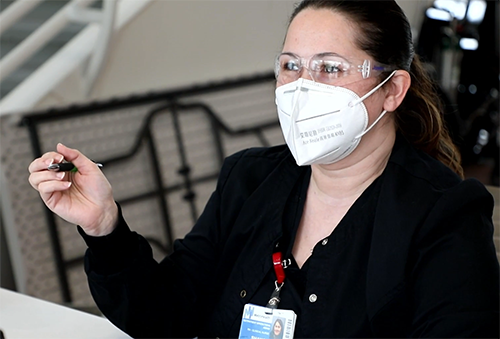Questions or concerns about your health care? MetroHealth Patient Relations is here to help you navigate your needs. Call 216-778-5800.
To become a Patient and Family Advisor, call 216-778-8934 or email PFA@metrohealth.org.
This is the second in our series of patient advocacy articles, exploring how you can empower yourself to receive the best possible care.
As patients, we value our physician’s expertise, but there’s another voice that’s equally important — our own. It’s vital that we take an active role in our health care.
Robert Chiuchiarelli of Middleburg Heights had to do just that with the help of Holly B. Perzy, MD, an internal medicine and pediatric physician at MetroHealth, whom he has known since he was a child. The two recently forged a patient advocacy partnership to ensure that he received the right treatment for his polycystic kidney disease (PKD).
“Without her I wouldn’t feel as good as I do today,” said the 30-year-old, who now sees
Dr. Perzy for her internal medicine expertise. “She’s a driving force and catalyst for me to feel like I could live my best life.”
Mr. Chiuchiarelli was diagnosed with PKD when he was eight years old. It’s a genetic condition in which cysts grow in the kidneys, potentially damaging them. For about the last year, his left kidney had been giving him problems. “While this wasn’t life-threatening, it certainly wasn’t enjoyable,” he said, adding that he was also tired all the time. At one point, his blood pressure rose dangerously to 210 over 110, a complication of PKD, and he went to MetroHealth’s Main Campus Medical Center.
A consultant nephrologist at MetroHealth, Rupesh Raina, MD, and Dr. Perzy told
Mr. Chiuchiarelli that he probably needed to have his left kidney removed, a procedure called a nephrectomy, because it was no longer functioning properly. “It was making my life miserable,” he said.
However, surgeons were reluctant to take his case because of his kidney scan test results, which showed that his left kidney was functioning at 35 percent (surgeons typically recommend a nephrectomy only when the function is at 20 percent or less). However, his results were likely inaccurate because of the amount of fluid in the kidney. Still, some doctors wouldn’t even make an appointment to talk about the possibility of having the procedure.
“Fortunately, Dr. Perzy was like the quarterback,” he said. “She reached out to people so that I could achieve the goal of removing my kidney to improve my quality of life.”
Dr. Perzy saw Mr. Chiuchiarelli as more than a kidney function number. “I really needed to advocate for Rob,” she said. “I think it is so important for physicians to know the patient holistically. That takes time. Knowing Rob as a child and being with him through his diagnosis and disease progression have enabled me to understand what was important to him.”
With Dr. Perzy’s persistence, she and Mr. Chiuchiarelli were able to find a surgeon — the seventh one they approached in the area — who was willing to look beyond test results. Like Dr. Perzy, this surgeon viewed Mr. Chiuchiarelli as a whole person and could see how the poorly functioning kidney was negatively impacting his health.
After the procedure, Mr. Chiuchiarelli was told his diseased kidney weighed nearly 40 pounds. “It was so large that it was pushing on my heart, which was one reason I was exhausted all the time,” he said.
Today, he is recovering at home and can walk for more than 10 to 15 minutes at a time and take the stairs without pain and shortness of breath. “It’s been an incredible change,” he said.
Dr. Perzy urges her colleagues not to underestimate their patients’ voices. “I find that people really do have an understanding of their own bodies,” she said. “As physicians, we need to listen and appreciate that.”
Overall, she said, it comes back to the relationship between doctor and patient. “If we have a trusting relationship, we can have the tough conversations. Patience, persistence and trust have been key for Rob and me,” she said.
Based on his experience, Mr. Chiuchiarelli has the following patient advocacy tips:
Do not be defined by your disease. It’s just one facet of yourself. Think about how you’re living your life and what’s important to you and share this information with your doctors.
Get a second, or third (or fourth) opinion. If you think that a procedure or treatment might be right for you, and your doctor disagrees, seek other opinions. While these opinions may still not be what you want to hear, you’ll be fully informed about your care.
Find a doctor who will listen to you. Having a health provider who wants to know more about you than your latest test results is invaluable. A doctor who understands the challenges you may be having with daily living and your goals for quality of life can better formulate the right treatment plan for you.
Educate yourself using trustworthy sources. In addition to reading online studies published in peer-reviewed medical journals, Mr. Chiuchiarelli used the National Kidney Foundation and the Polycystic Kidney Diseases Foundation to learn more about his condition and when surgery might be an option.
Find a doctor, nurse or patient navigator who can talk you through medical jargon. You can’t advocate for yourself if you don’t understand the medical information that’s being given to you. Speak up if you can’t make sense of test results or need more information about your condition or treatment.
Questions or concerns about your health care? MetroHealth Patient Relations is here to help you navigate your needs. Call 216-778-5800.
“I have been both a patient and a caregiver to a patient of The MetroHealth System. This gives me a different perspective from that of a professional medical healthcare provider. Being a Patient Family Advisor has allowed me the opportunity to be a viable team member within MetroHealth. My input is heard and considered to improve the quality of care.”
-Eartha Weston, Patient and Family Advisor Co-Chair, PFAC
To become a Patient and Family Advisor, call 216-778-8934 or email PFA@metrohealth.org.
Contributor:

Holly Perzy, MD
Internal Medicine & Pediatrics











